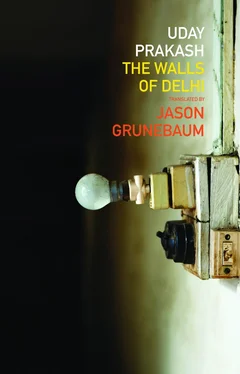And how this girl looked though the soap lather that glittered like dewdrops, how it took his breath away, this was a new sensation.
Shobha stood up in her dripping wet sari and began drying her hair with a towel.
The magnetic field that originated from the water tap and enveloped him was also something new. It was like a zap from inside inducing him toward her with full force. His mind was in a bad way. He could see only colours swimming in front of his eyes, like the soap bubbles that floated in the air.
He walked up behind Shobha and clasped her around the waist, then lifted her back into the half flat, the ten-by-seven ‘room’ that, for the moment, was the Delhi home of these two winged creatures.
Shobha said nothing. She was still wet; her hair too, eyes closed, face flushed with a flame that slowly let its heat seep over her body, and into her blood, until heat rose from her skin and met Chandrakant’s lips. Not a drop of dew escaped his waiting mouth while hands explored every place on Shobha’s body, tracing her wet skin.
The little mat on the floor beside the trunk, in the cramped half flat, was wringing wet. And atop that wet rug Chandu and Shobha seized one another as if at the epicentre of a consuming blaze. Soap bubbles of all hues seeped through the room, while outside on the balcony it wasn’t water that gushed from the tap and noisily filled the bucket, but a rainbow of colour.
Shobha felt as if she was sinking into a deep dream on a magic carpet, not just lying on a rug. Her wet sari lay to the side, while atop her body was a blushing nineteen-year-old boy, smiling nervously, rather than the old, savage inspector, or contractor, or the husband she had been made to marry. That night in Sarani, she had grabbed hold of the edge of the rope that sprang from the smile of the boy born while eating her homemade curry and roti. And now it looked as if she might make it out alive.
It was as if the mouth of nineteen-year-old Chandrakant, whom she had begun to call Chandu, was still stuffed with the bits of her food, hungry and blushing as he smiled. Overcome with love for Shobha, he gathered her tangled hair in his hands and kissed her feverishly.
After that Monday, some thirty years ago, and a mere ten days after the two of them had moved to their half flat at E-3/1, bylane number seven, Jahangirpuri, Shobha had begun referring to the covering on the floor as the carpet rather than a rug. She hummed while she worked, and after Chandrakant left for work in Vijaynagar, she sang duets with Lata Mangeshkar and Asha Bhosle on the radio.
Shobha prepared food for the two of them, peeled and chopped and sliced the vegetables, did their laundry, took naps, while Chandrakant swept her up and onto the magic carpet where the two of them would make love in a blaze of heat. Like this, years passed, Shobha grew plump, Chandrakant’s hair thinned and turned grey, both of them sometimes fell ill, then got better, all the while and for thirty years playing the nonstop game of fanning the flames atop their magic carpet.
Shobha got pregnant seven times. She registered with the government hospital in Aadarsh Nagar, stitched and sewed clothes and booties and a bed for the baby, and ate and drank with great precaution. But either she miscarried, or the baby succumbed to an illness a few months after birth — each and every time. Chandrakant and Shobha were devastated. They decided that the mosquitoes and bacteria from the sewage gutter in front of their house had infected the babies with some illness; a thick, damp, and often strong stench came through their windows from the gutter. During the monsoon season, earthworms, centipedes, millipedes, snails, and frogs would crawl or hop from the gutter into their flat. One time when Shobha and Chandrakant were deep in the middle of playing their favourite game on the magic carpet, Shobha screamed when she saw a baby snake slithering on the ground off to her left. Another time it was a boa constrictor that sprang out from behind a box. Things got even worst during the rainy season — spiders were everywhere.
Both of them wished to move somewhere else, somewhere clean and tidy. But as time went on, rents began to soar. Chandrakant had always been on the lookout for another job or additional income, but nothing ever materialised. His boss at the shop, Gulshan Arora, was a good man, and no other shopkeeper would have paid a better salary. Over the thirty years, Arora had become an elderly seventy-year-old. Both his daughters had been married off, and he had one son who ran a small travel agency in Paharganj. Father and son didn’t get along, and the son didn’t care about the father’s shop. The son, too, was already married, and had for the past several years waited for his father to die so he could sell the Kwality Departmental Stores. Gulshan Arora seemed to have an inkling of his son’s wishes: time and again after a serious illness he returned from the brink of death, as if to dash his son’s hopes. Gulshan Arora placed great faith in Chandrakant, since he didn’t have any other option. The store limped along, but Arora still had to pay expenses.
Gulshan Arora was by then totally alone; his wife had died a dozen or so years ago. He had detained Chandrakant at his house on several occasions for late-night rum-drinking and chicken-eating sessions. He told Chandrakant not to worry about his inevitable death: he had left the store to his younger daughter, and had made a provision in his will for Chandrakant to the amount of 200,000 rupees. After the third or fourth drink, Gulshan Arora got animated and waxed philosophical. Chandrakant was aware that his boss, in spite of his age, brought home call girls, and was continuously taking herbal supplements and vitamin boosters called ‘Lion Life,’ ‘Shot Gun,’ and ‘Hard Rock Candy Man’ — these were the days before anyone had heard of Viagra or 40–60 Plus.
Chandrakant, while listening to his seventy-year-old boss’s elaborate stories, would often begin to long for the man’s death — and just then, Gulshan Arora by some means sensed his thoughts, smiled from ear to ear, and said, ‘Chandu! Enough with your dreaming of my death. My father was eighty-two when he came here from Lahore in ’47, and when he died in ’74, he was over a hundred and ten. The neighbourhood had a huge celebration for his funeral procession, and we even hired the Daulatram Band and gave away endless sweets.’
It was then he showed the palm of his hand to Chandrakant. ‘The astrologer told me that I’ve got at least thirty-five more years. Then, after I turn one hundred and five, I’m gonna get me on that morning train, loud and high right up to the sky! But don’t you worry, Chandu. Your job’s even more secure than a government one.
‘Wrap up the rest of this chicken for your wife and be on your way,’ he said to Chandrakant in a hushed voice. ‘I’ve got a working girl on her way, and she’ll be here any second. You get to work over there in Jahangirpuri, and I’ll get to work over here in Model Town.’
But the children of Chandrakant and Shobha never got as old as Gulshan Arora’s. One after the other, the babies born to them in that half flat in bylane number seven kept dying. None lived longer than four months.
Not one or two, but seven babies in a row. ABHANG SONGS, KHUSRAU, THE DARGAH, AND THE FIRST SURVIVING CHILD
It happened perhaps some winter’s evening in 1995, some ten years ago. I went to the Kwality Departmental Stores in Vijaynagar. I had quit my day job five years prior and was then as I am now a freelance Hindi writer.
I had my mortgage and other expenses to pay. Winter was around the corner, and I still hadn’t managed to buy warm clothing for the kids. I myself had been wearing the very same sweater twenty winters in a row. My wife hadn’t been able to treat herself to a nice sari or buy any jewellery since the day we married. We avoided weddings since we lacked proper attire, and couldn’t afford a present for the bride and groom in any case. We cut each piece of mango pickle into quarters, and rinsed whatever slices of onion were left on the thali, saving them for next time. We horded five rupee coins during the year, saving them up to give away on Divali. I thought a few times about ending it all, or running away, but then my kids always brought me back. They were still in school. Books came into my life like a curse, and took everything I had. Sometimes it was the stories of Isaac Bashevis Singer, or else Orwell’s Down and Out in Paris and London, or Gorky’s autobiography — reading them brought me some respite. Maybe every writer’s fate is to live on the street, in the gutter. Or maybe I just worried more than most because I wasn’t famous and wasn’t important.
Читать дальше










